
"Angels" is a song by the English singer-songwriter Robbie Williams. It was included on Williams's debut solo album, Life thru a Lens (1997), and released as a single on 1 December 1997 by Chrysalis. "Angels" was written by Williams and Guy Chambers, who produced alongside Steve Power. The song is based on an earlier version written by Ray Heffernan.
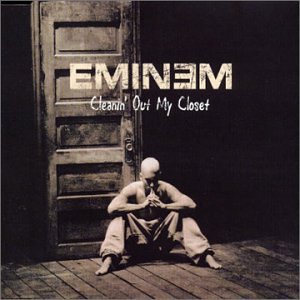
"Cleanin' Out My Closet" is a song by American rapper Eminem from his album The Eminem Show (2002). It was the second single released off the album following "Without Me" on July 29, 2002. Unlike the preceding single which was as his humorous Slim Shady persona, "Cleanin' Out My Closet" was a serious song inspired by the events of Eminem's childhood and relationships. It depicts Eminem venting his anger towards his mother, Debbie Mathers, for the way she raised him. In the chorus, Eminem sarcastically apologizes to his mother for hurting her and making her cry, but takes it back by showing the world what his mother, according to him, was like.

"If I Ain't Got You" is a song recorded by American singer-songwriter Alicia Keys for her second studio album The Diary of Alicia Keys (2003). Inspired by the 2001 death of singer Aaliyah, the September 11 attacks, and other events in the world and in Keys' life, the song is about "how material things don't feed the soul". It was released as the second single from The Diary of Alicia Keys on February 17, 2004, by J Records. The single cover depicts Keys similarly to the subject of Man Ray's 1924 photograph Le Violon d'Ingres.

"Thank You" is a song written and performed by English singer-songwriter Dido. The song made its first appearance in 1998 on the soundtrack of the movie Sliding Doors. It was later included on Dido's 1999 debut album, No Angel, and was released as a single on 18 September 2000. The same year, American rapper Eminem sampled the track for his hit single "Stan", which helped propel "Thank You" and No Angel to mainstream success.

"Sunday Girl" is a song recorded by the American new wave band Blondie, from the band's 1978 album Parallel Lines. Written by guitarist Chris Stein, the song was inspired by Debbie Harry's cat, who was named Sunday Man—the cat had recently run away, inspiring the song's "plaintive" nature.

Christina Klein, better known by her stage name LaFee, is a German pop singer and television actress who has sold more than one million records worldwide. She is most famous in mainland Europe, particularly in German-speaking countries.

"Beggin'" is a song composed by Bob Gaudio and Peggy Farina and first released as a single by American band the Four Seasons in 1967. Initially charting at number 16 in the US Billboard Chart, the song became popular in the Northern soul scene in the United Kingdom in the 1970s. It has been covered multiple times, with versions by Norwegian hip-hop duo Madcon and Italian rock band Måneskin topping music charts in Europe and beyond. The Four Seasons' version was remixed in 2007 by French DJ Pilooski and re-released as a single, reaching number 32 in the UK Singles Chart, commercially outperforming the band's original release in the UK.

"Fantasy" is a song by American band Earth, Wind & Fire, which was issued as a single in 1978 by Columbia Records.

"Big in Japan" is the debut single of German synth-pop band Alphaville, from their 1984 album Forever Young.

LaFee is the debut album recorded by German pop rock singer LaFee.

"Heul doch" and "Shut Up" are rock songs by German singer LaFee. They were written by Bob Arnz and Gerd Zimmermann. The German version of the song, "Heul doch", appears on Lafee's 2007 second studio album Jetzt erst recht where it is the second track. It was released as the album's first single and reached number 3 in the German singles chart when released in May 2007.
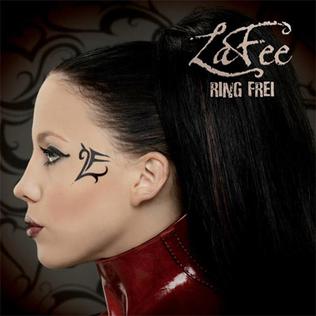
"Ring frei" is a song by German singer LaFee. It was written by Bob Arnz, Gerd Zimmermann and Lafee for her fourth studio album Ring frei. The song is the album's second track and it was released as the album's first single on 21 November 2008.

"Infinity", also known as "Infinity ", is the debut single by British acid house musician Guru Josh. It was originally released in December 1989 as the lead single from his debut album of the same name. The song was re-released in 2008 in a remixed version called "Infinity 2008", and once again in 2012 as "Infinity 2012".

"If I Had You" is a song by American recording artist and American Idol season eight runner-up Adam Lambert. The song was written by Max Martin, Shellback, and Savan Kotecha and produced by Martin, Shellback and Kristian Lundin for Lambert's debut album, For Your Entertainment (2009). It was released as the third and final international single from the album on May 11, 2010. The song reached number 30 in the United States and reached the top ten in Australia, Canada, Finland, Hungary and New Zealand. The song was performed on Lambert's first concert tour, the 2010 Glam Nation Tour where it was the show's finale.

"Higher" is the fifth single from English singer-songwriter Taio Cruz's second studio album, Rokstarr. It was written and produced by Cruz and Sandy Vee, and was released on 26 November 2010. This song was originally written for Australian singer Kylie Minogue's album Aphrodite, but plans fell through. However, Cruz and Minogue recorded a version of the song for the European release, while American rapper Travie McCoy recorded guest raps for the American release. The Brazilian and United Kingdom versions have parts of McCoy's rap mixed into the Minogue version. The version on Cruz's albums feature a solo vocal by Cruz with no guest vocalist and an edited version of the solo version was added to Radio Disney's playlist.
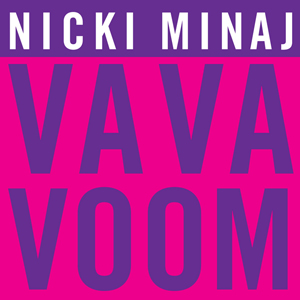
"Va Va Voom" is a song by rapper Nicki Minaj from the deluxe edition of her second studio album, Pink Friday: Roman Reloaded. It was released on October 23, 2012 by Young Money, Cash Money, and Universal Republic as the sixth and final single from the album.
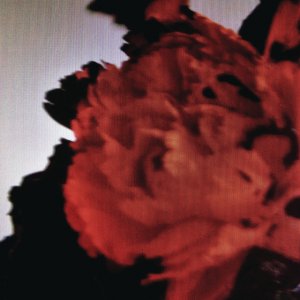
"All of Me" is a song by American singer John Legend from his fourth studio album Love in the Future (2013). It is dedicated to Legend's wife Chrissy Teigen. "All of Me" first aired on American mainstream urban radio as the album's third single on August 12, 2013.

"Up" is a song by English singer Olly Murs, released on 1 December 2014 as the second single from his fourth studio album, Never Been Better (2014). It features American singer Demi Lovato and is also featured on the deluxe version of Lovato's fourth album, Demi. It was written and produced by Daniel Davidsen, Peter Wallevik and Cutfather, with additional writing from Wayne Hector, and Maegan Cottone.
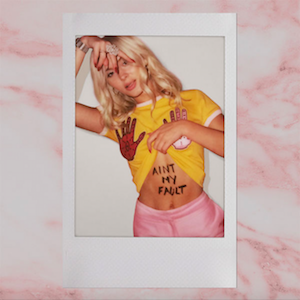
"Ain't My Fault" is a song by Swedish singer Zara Larsson from her second studio album So Good (2017). It was released on 2 September 2016 through TEN Music Group and Epic Records as the third single from the album. The song received positive reviews from critics upon its release and peaked at number one in Sweden, the top ten in Norway and Romania, and the top 20 in ten additional countries. It is certified Gold or higher in sixteen countries. The remix version of the song features American rapper Lil Yachty.

"No Promises" is a song recorded by American DJ group Cheat Codes. It features vocals by American singer and songwriter Demi Lovato as well as Trevor Dahl, a member of the group. The song was released on March 31, 2017, and debuted on mainstream radio in the United States on April 11, 2017. "No Promises" was written by the group members, along with Lovato, Lauv, and Loote, who co-produced the song with group member Trevor Dahl and Leff, while Mitch Allan produced its vocals. The track reached number one in Israel, the top 10 in Latvia, Malaysia, and Poland, as well as the top 20 in Australia, Ireland, New Zealand, Portugal, Scotland, and the United Kingdom, and the top 30 in Denmark, Hungary, and Serbia. The song is also certified Platinum in the US, UK, and seven additional countries. An acoustic version of the song is included on the deluxe version of Lovato's sixth album Tell Me You Love Me.




















